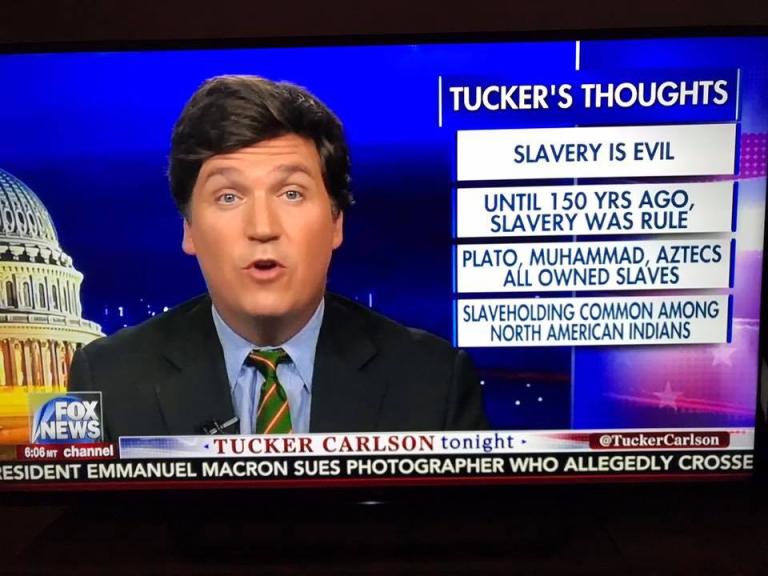A Facebook friend captured this moment on Fox News this week:

Tucker Carlson stands by text boxes labeled “Tucker’s Thoughts”:
Slavery is evil
Until 150 yrs ago, slavery was rule
Plato, Muhammad, Aztecs all owned slaves
Slaveholding common among North American Indians
I know this game. I’ve played it before, opposite people like Carlson. I played it most recently just last week, actually, when a relative stated that the African slaves brought to the U.S. were sold to white slavers by other Africans. The problem is not that this is untrue. The problem is not that it is untrue that the Aztecs or Native Americans owned slaves. The problem is that these comments are typically made disingenuously, in the interest of scoring points and not in the interest of better understanding an issue.
Carlson’s comments are especially disingenuous.
Let me start with an admitted nitpick: Carlson’s claim that slavery was the “rule” until 150 years ago. Yes, the Civil War ended 152 years ago. However, slavery was banned in the northern U.S. states decades before this, and in Great Britain in 1833. Indeed, most Western European nations banned slavery prior to 150 years ago—and many other countries banned slavery years after slavery ended in the U.S. Carlson’s statement that “slavery was rule” until 150 years ago assumes the world revolves around the U.S.
What of Carlson’s statement that Plato, Muhammad, the Aztecs, and Native Americans owned slaves? The problem here is twofold. First, it reads as excuse-making. Remember the context: this coverage came immediately after a Nazi and KKK rally. There was no reason to follow “slavery is evil” with a laundry list of other groups who also owned slaves.
It’s a sort of “you also” statement. They did it too!
But second, Carlson’s bullet-point list erases the differences in how slavery has been practiced in different cultures and at different times. Slavery has not always looked the same in every group and at every period.
Slavery in the American colonies was not initially generational—at one point, a slave’s children were born free. This was also how slavery was practiced among the Aztecs, and in much of Africa. People were not typically born into slavery, generation after generation. In fact, it was not initially clear in the colonies that slavery was for life rather than for a period of years (another way slavery has been practiced around the world). These questions were answered in the colonies’ evolving legal codes.
Initially, black slaves in the American colonies worked alongside white indentured servants, bound to servitude for a period of years. Slaves and indentured servants ran away from their masters together, and freed slaves went on to own white indentured servants. At the same time, there were Chinese slaves and Indian slaves in Portugal, and European slaves in the Ottoman Empire. Slavery and servitude crossed lines of color.
Prior to the antebellum period, slavery typically took place independent from any idea that the enslaved were racially inferior to those who enslaved them. Slaves were taken in war, or enslaved due to debt. Being a slave was seen as an unfortunate product of one’s circumstances, not something inscribed in one’s genes. By the antebellum period, however, black slaves were seen as mentally inferior, not capable of governing themselves, and even created for enslavement by God himself.
Perhaps the problem is with the terms “slavery” and “slave.” We use these terms to reference very different practices. What it meant to be a slave in the antebellum South was drastically and substantively different from what it meant to be a slave among the Aztecs, but we use the same word—“slave”—to describe each. Being a slave in Virginia in 1620 was completely different from being a slave in Virginia in 1820—and yet we use the same term for each.
Statements like Carlson’s obfuscate all of this in what reads like a deliberate effort to downplay the particular evil that was antebellum Slavery. Slavery as practiced in the antebellum South wasn’t par for the course. It wasn’t slavery as slavery had always been practiced. Antebellum slavery was different: It was race-based and generational.
It is perhaps unsurprising that Western nations banned slavery when they did (and not before). Antebellum slavery put the moral evil of slavery in stark relief.
I have a Patreon! Please support my writing!















